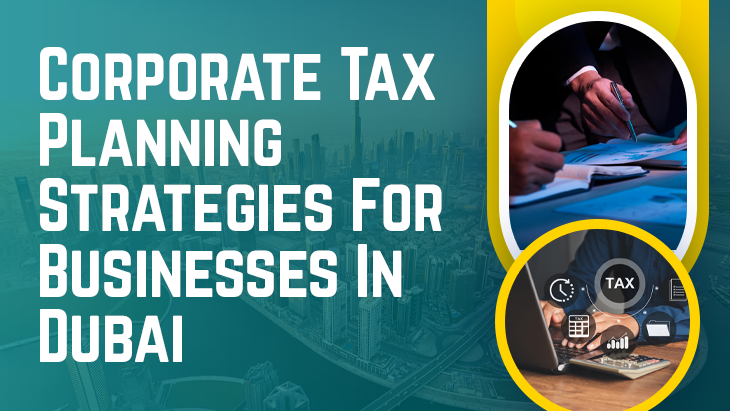Due to its tax-friendly policies, Dubai has long been recognised as a global business hub. However, recent years have seen a shift towards greater fiscal regulation. The introduction of corporate tax in the UAE is a significant milestone that entrepreneurs and business owners must take seriously. Understanding and planning for these changes is crucial for maintaining compliance and optimising profits, especially for those pursuing business setup in Dubai.
The Shift from Tax-Free to Tax-Aware
Historically, Dubai attracted businesses with its zero-tax regime. However, corporate tax is now a key consideration, along with the UAE's commitment to international tax standards and efforts to prevent base erosion and profit shifting (BEPS). While the tax rate remains competitive at 9% for taxable income exceeding AED 375,000, businesses must adopt a tax-aware approach to sustain their advantages.
Why Corporate Tax Matters in Dubai Today
Corporate tax impacts profitability, investment decisions, and global competitiveness. Relying on the UAE's tax advantages is no longer enough; businesses must strategically plan their operations to remain compliant and efficient. This includes analysing corporate structures, documenting expenses, and understanding the impact of international tax laws. Companies seeking company formation services must factor tax planning into their strategy.
Understanding Corporate Tax in the UAE
1. Overview of the UAE Corporate Tax Regime
The UAE introduced corporate tax to align with global tax standards and promote transparency. As of June 1, 2023, businesses operating in the UAE are subject to a 9% corporate tax on annual profits exceeding AED 375,000. The tax applies to mainland companies, with specific provisions for free zone entities.
2. Who Is Liable to Pay Corporate Tax?
Corporate tax applies to UAE-incorporated entities, foreign legal entities with a permanent establishment, and individuals engaged in business or commercial activities. Free zone companies can benefit from 0% tax if they meet qualifying conditions, including maintaining adequate substance and earning qualifying income.
3. Exemptions and Free Zones Explained
Entities exempt from corporate tax include government entities, government-controlled entities, extractive businesses (subject to Emirate-level taxation), and qualifying public benefit entities. Free zone businesses can enjoy 0% tax if they earn qualifying income, maintain economic substance, and do not conduct business with the mainland. Any non-qualifying income is taxed at 9%.
Key Principles of Corporate Tax Planning
What is Corporate Tax Planning?
Corporate tax planning involves strategically analysing and arranging a company’s financial affairs to minimise tax liability while ensuring compliance. This consists of leveraging legal deductions and exemptions and structuring business operations efficiently.
Benefits of Effective Tax Planning
Effective corporate tax planning can reduce tax liability, improve cash flow, enhance investment potential, increase regulatory compliance, and give companies a competitive business advantage.
Corporate Structures That Optimize Tax
1. Choosing the Right Business Structure
Selecting an appropriate legal structure is essential for effective tax planning. Businesses can consider setting up as a mainland, free zone, or offshore entity, depending on their goals:
• Mainland companies are subject to corporate tax but have unrestricted access to the UAE market.
• Free zone entities may qualify for 0% tax, but are limited in where they can conduct business.
• Offshore company formation in Dubai is generally tax-exempt but limited to international operations.
2. Holding Companies as a Tax Tool
Holding companies can centralise control and reduce tax obligations. Benefits include dividend exemptions, reduced withholding tax through treaties, and consolidating profits and losses across subsidiaries.
Leveraging UAE Free Zones for Tax Planning
Benefits of Free Zones
Free zones offer numerous tax and operational advantages. These include 100% foreign ownership, 0% import/export duties, simplified customs procedures, streamlined visa processing, and the possibility of 0% corporate tax if conditions are met.
Qualifying for 0% Corporate Tax in Free Zones
To benefit from 0% corporate tax, businesses must earn qualifying income (from outside the UAE or other free zones), meet economic substance requirements, and maintain audited financial statements. Entrepreneurs interested in free zone company formation in Dubai can find this especially beneficial.
Transfer Pricing and Its Role in Tax Planning
What is Transfer Pricing?
Transfer pricing involves setting prices for transactions between related entities within a multinational group. It ensures transactions reflect market conditions (the arm’s length principle) and prevent tax base erosion.
Compliance and Documentation Requirements
Businesses must prepare transfer pricing documentation, including a Master and Local file. They must also justify intercompany transactions, submit annual disclosure forms, and maintain proper agreements and analysis for audits.
International Tax Treaties and Their Benefits
Double Taxation Agreements (DTAs)
The UAE has signed over 135 DTAs to prevent businesses from being taxed twice on the same income. These treaties provide reduced withholding tax rates, exemptions on specific income types, and dispute resolution mechanisms.
Utilising Treaties to Avoid Tax Duplication
Companies can benefit from DTAs by identifying relevant treaties for their operations, structuring international transactions accordingly, and documenting residency and beneficial ownership.
Deductible Expenses and Allowances
What Can Be Deducted Legally?
Businesses can deduct expenses that are wholly and exclusively incurred for business purposes, reasonable, not capital, and supported by proper documentation. Examples include salaries and wages, rent and utilities, professional and legal fees, and marketing expenses. Expert assistance from firms offering TAX & VAT services in Dubai can help optimise these deductions.
Maximising Deductions Without Red Flags
To avoid audit scrutiny, businesses should avoid inflated or fictitious expenses, maintain all receipts and records, and ensure consistency in financial reporting.
Loss Carryforwards and Tax Credits
Using Past Losses to Reduce Future Tax Bills
Businesses can carry forward tax losses for up to five years to offset future profits and reduce taxable income. This is conditional upon maintaining 50% ownership continuity and active business operations.
Understanding Tax Credits in the UAE
Tax credits may be available to offset corporate tax liability, such as foreign tax credits for income taxed abroad and withholding tax credits under treaties.
Tax Planning for Multinational Corporations
Cross-Border Planning Considerations
Multinational businesses must consider jurisdictional tax rates, permanent establishment risks, withholding taxes, and double taxation relief when structuring cross-border operations.
Controlled Foreign Company (CFC) Rules
CFC rules are designed to prevent profit shifting to low-tax jurisdictions. While the UAE has not yet implemented CFC rules, businesses should stay informed of future changes that are aligned with OECD guidelines.
Importance of Proper Bookkeeping and Documentation
Accounting Standards in the UAE
Companies must maintain accounting records according to International Financial Reporting Standards (IFRS). This promotes compliance with tax laws and transparency and simplifies audits and filings.
Audit Requirements for Businesses
Audit requirements vary by company type and jurisdiction. Many businesses, especially those in free zones seeking tax benefits, must maintain audited financials.
Engaging with Tax Consultants and Advisors
Why Expert Guidance Matters
Corporate tax laws in Dubai can be complex. Engaging experienced tax consultants ensures strategic planning, correct structuring, thorough documentation, and expert handling of audits and disputes.
Choosing the Right Tax Advisor in Dubai
When selecting a tax advisor, businesses should prioritise professionals with UAE-specific expertise, knowledge of international tax laws, tailored advisory capabilities, and registration with the Federal Tax Authority (FTA).
Common Corporate Tax Mistakes to Avoid
Misinterpreting Free Zone Rules
Many businesses mistakenly assume all free zone income is tax-exempt. In reality, only qualifying income enjoys 0% tax. Conducting business with the mainland can lead to a 9% tax liability.
Inadequate Transfer Pricing Documentation
Failure to maintain proper documentation for transfer pricing can result in penalties and reassessments. All intercompany transactions should be well-documented and follow arm’s length principles.
Preparing for Tax Audits
What Triggers an Audit?
Audits may be triggered by inconsistent filings, abnormal expense patterns, related party transactions, or the FTA's random selection.
How to Be Audit-Ready All Year Round
Businesses should maintain accurate records, update documentation regularly, review compliance periodically, and consider mock audits conducted by professional advisors.
Future of Corporate Tax in Dubai
Upcoming Changes and Trends
Future developments in the UAE tax landscape may include CFC rules, enhanced enforcement, advanced pricing agreements (APAs), and broader tax audit coverage.
Staying Compliant in a Dynamic Environment
To stay compliant, businesses should monitor FTA updates, invest in tax compliance tools, train their finance teams, and revisit their tax strategy annually.
The Smart Way Forward with Tax Planning
Corporate tax in Dubai presents both challenges and opportunities. With proactive planning, businesses can minimise liabilities and stay compliant. Each step, from choosing the right structure to leveraging treaties and deductions, plays a role in efficient tax management.
Partnering with experts like Bizex LLC can ensure your tax strategy aligns with your business goals. Our experienced advisors help you navigate Dubai's evolving tax environment with confidence. Whether you operate on the mainland or in a free zone, we help you stay compliant and tax-efficient.
Frequently Asked Questions (FAQs)
1. When did corporate tax become effective in the UAE?
Corporate tax became effective on June 1, 2023.
2. Who is exempt from corporate tax in Dubai?
Government entities, qualifying free zone companies, and public benefit entities may be exempt.
3. What is the corporate tax rate in the UAE?
A standard 9% applies to taxable income above AED 375,000.
4. Are all free zone businesses exempt from tax?
No. Only those earning a qualifying income and meeting specific conditions enjoy 0% tax.
5. What are the qualifying income sources in free zones?
Income from transactions with other free zones or foreign clients may qualify.
6. What is transfer pricing in corporate tax?
Transfer pricing refers to pricing arrangements between related parties within a group.
7. Can I deduct all business expenses for tax purposes?
Only legitimate, documented, and business-related expenses are deductible.
8. How can I carry forward losses?
Losses can be carried forward for up to five years if ownership and operations are consistent.
9. Do I need to file audited financials in Dubai?
It depends on your jurisdiction, business size, and whether you seek tax incentives.
10. Should I hire a tax advisor in Dubai?
Yes. Tax advisors ensure compliance, help reduce liability, and guide tax-efficient structuring.











Leave a reply